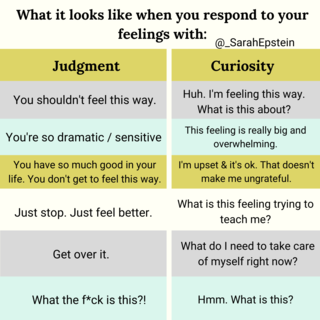How to Defeat Your Inner Critic
And make room for a gentler internal voice
by Sarah Epstein MFTMany of us walk around with an inner critic that narrates our daily actions and renders a stream of harsh, hurtful judgements about our abilities and worth. It is the voice that says:
- Good outcomes happen because of good luck, and bad outcomes happen because you are not good enough.
- You didn’t go to the gym because you are lazy and you never do what you say you’re going to do, and not going to the gym was proof.
- Your date didn’t go well because you’re not interesting, and who would want to be with you anyway?
- You will never be good enough no matter what you do.
This voice occurs with a harshness that we reserve only for ourselves. The voice becomes automatic, white noise that shapes our inner experience and robs us of the consideration, kindness, and encouragement we so easily give to others. But when we finally notice the voice and resolve to shift the voice, we combat it with a barrage of still harsher judgement and self-deprecation. We ask ourselves things like:
- Why can’t I just be nicer to myself?
- Why can’t I just stop already?
- Why can’t the voice just go away?
- Why can’t I just be happy with myself like everybody else?
The fight to feel good about ourselves becomes just another way that we beat ourselves up. The voice is sneaky that way.

Curiosity as the antidote to self-critical thinking
If harshness begets more harshness, how do we combat our inner critic that voice that has made itself at home in our subconscious mind? We can harness curiosity. Curiosity loves to notice. When curiosity enters the process, we can shift the process to overcome our inner critic with kindness. As famed author Elizabeth Gilbert said, “Curiosity only does one thing, and that is to give. And what it gives you are clues on the incredible scavenger hunt of your life.” So, using curiosity as your guide, you can switch from saying, “Here I go again, beating myself up,” we can employ curiosity and instead say, “Hmm, there it is again. That voice telling me that my mistake means I’m a terrible employee. I wonder where I learned that it wasn’t ok to make mistakes.” When we catch ourselves downplaying an achievement, instead of saying, “No, I just got lucky with the assignment,” we might employ curiosity and say, “Wow, look at that. I did well, yet the voice told me I shouldn’t take credit, that it wasn’t really my skills that led to success. Huh. How long have I been talking to myself that way?”
Using curiosity, a person can look non-judgmentally at the internal dialogue and ask questions like:
- How did this voice develop?
- Where did I learn the messaging I keep repeating to myself?
- When did this voice develop?
- When does it come out (at work, say) and when does it stay away?
- What purpose does the inner critic play?
- Is the critic reinforcing a narrative that I learned as a kid?
- Is the critic gathering proof that I’m unworthy of love and success?
While the voice is judgmental and harsh, sees the world in black and white terms, and relentlessly tries to prevent us from seeing beyond our flaws, curiosity brings gentleness, nuance, and thoughtfulness back to the table. When we stop yelling at ourselves and look curiously at the way our thoughts play out, we give ourselves the space to understand them. Only through understanding can we start to address the underlying beliefs that drive that voice and begin to shift them towards a gentler inner-dialogue.